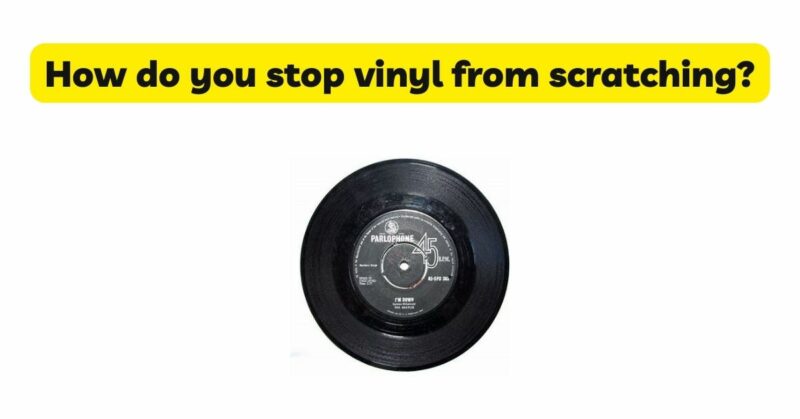Vinyl records have made a remarkable resurgence in recent years, attracting both audiophiles and music enthusiasts alike. The warm and nostalgic sound they produce, combined with the tangible experience of handling physical records, has made vinyl a beloved medium for music consumption. However, vinyl records are delicate, and their pristine sound quality depends on proper handling and care. One of the most common issues faced by vinyl collectors is scratching, which can significantly impact sound quality and ruin your listening experience. In this article, we will delve into the causes of scratching and provide you with effective strategies to prevent it, ensuring your vinyl collection remains in top-notch condition for years to come.
- Understand the Causes of Scratching
To effectively prevent vinyl records from scratching, it’s essential to first understand the causes behind this common issue. Scratches on vinyl records occur due to physical contact with various objects, leading to damage on the delicate grooves that carry the sound. Some of the primary causes of scratching include:
a) Dust and Debris: Dust particles, tiny hairs, and other debris on the record surface can act as abrasive agents when the stylus (needle) comes in contact with them, causing scratches.
b) Poor Handling: Mishandling the vinyl, such as dropping it or placing it on rough surfaces, can lead to visible scratches and, in severe cases, even deep gouges on the record.
c) Incorrect Storage: Storing records improperly, without protective sleeves or in stacks, can increase the chances of scratches and scuffs.
d) Dust Cover Mishaps: Carelessly sliding the dust cover back on the record without proper alignment may cause contact between the cover and the record’s surface, resulting in scratches.
e) Dirty Stylus: A stylus that hasn’t been cleaned regularly can accumulate debris, which may scratch the record during playback.
- Invest in Quality Inner Sleeves and Outer Jackets
The first line of defense against scratches is investing in high-quality inner sleeves and outer jackets for your vinyl records. Most vinyl records come with standard paper or polyethylene inner sleeves, which do little to protect the record surface from dust and debris. Upgrading to anti-static inner sleeves made of materials like rice paper, polypropylene, or polyethylene with an antistatic lining significantly reduces the risk of scratching.
Additionally, outer jackets play a crucial role in protecting the record when it’s not in use. Thick, sturdy jackets with a soft inner lining safeguard the record from accidental bumps, scratches, and exposure to harmful elements like sunlight and moisture.
- Keep Your Vinyl Records Clean
Regular cleaning of your vinyl records is vital to prevent scratching and maintain optimal sound quality. Dust and debris, when left unattended, can act as abrasive agents during playback and cause irreparable damage to the grooves.
To clean your vinyl records effectively:
a) Use a Carbon Fiber Brush: Before every play, use a carbon fiber brush to remove surface dust and debris gently. The soft bristles of the brush attract and lift particles away from the record, reducing the risk of scratches.
b) Invest in a Record Cleaning Kit: Consider investing in a record cleaning kit that includes a cleaning solution and a microfiber cloth. Apply the cleaning solution as per the manufacturer’s instructions and wipe the record gently with the microfiber cloth to remove more stubborn dirt.
c) Avoid Household Cleaning Products: Avoid using household cleaning products like alcohol or glass cleaners, as they can damage the record surface and promote scratching.
- Handle Records with Care
Proper handling of vinyl records is crucial to preventing scratches and preserving their longevity. Follow these essential tips when handling your records:
a) Wash Your Hands: Always wash your hands thoroughly before handling vinyl records. Oils, lotions, and dirt on your hands can transfer onto the record surface and lead to scratching.
b) Hold Records by the Outer Edges or Label: Avoid touching the record surface with your fingers. Instead, hold the record by its outer edges or by the label to minimize contact with the grooves.
c) Use a Turntable Mat: Placing a soft turntable mat under the record while it’s spinning on the turntable can provide an extra layer of protection against scratches caused by accidental contact with the platter.
d) Avoid Stacking Records: Stacking records vertically can cause them to rub against each other, leading to scratches and scuffs. Store your records upright, using dividers or bookends to maintain proper spacing.
- Maintain and Clean Your Stylus
A dirty stylus can cause significant damage to your vinyl records. Over time, the stylus accumulates dust, debris, and residue from previous plays, which can be transferred to the record surface during playback.
To prevent scratching caused by a dirty stylus:
a) Clean the Stylus: Invest in a stylus cleaning brush or a stylus cleaning solution and follow the manufacturer’s instructions to clean the stylus regularly. Gently brush the stylus from back to front to remove any buildup.
b) Check Alignment and Tracking Force: Improper stylus alignment or incorrect tracking force can put undue pressure on the record, leading to scratches. Follow the turntable manufacturer’s guidelines for stylus alignment and tracking force adjustment.
Conclusion
Vinyl records are not just a medium for listening to music but also cherished collectibles with historical and sentimental value. To preserve their sound quality and ensure their longevity, it’s crucial to prevent scratching. By understanding the causes of scratching and following the preventive measures outlined in this article, you can enjoy your vinyl collection for years to come. Remember, a combination of proper handling, regular cleaning, quality storage options, and a well-maintained stylus will go a long way in protecting your vinyl records and maintaining their pristine condition.


